There was a table set out under a tree in front of the house, and the March Hare and the Hatter were having tea at it: a Dormouse was sitting between them, fast asleep, and the other two were using it as a cushion, resting their elbows on it, and talking over its head. 'Very uncomfortable for the Dormouse,' thought Alice; 'only, as it's asleep, I suppose it doesn't mind.'
The table was a large one, but the three were all crowded together at one corner of it: 'No room! No room!' they cried out when they saw Alice coming. 'There's plenty of room!' said Alice indignantly, and she sat down in a large arm-chair at one end of the table.
'Have some wine,' the March Hare said in an encouraging tone.
Alice looked all round the table, but there was nothing on it but tea. 'I don't see any wine,' she remarked.
'There isn't any,' said the March Hare.
'Then it wasn't very civil of you to offer it,' said Alice angrily.
'It wasn't very civil of you to sit down without being invited,'said the March Hare.
'I didn't know it was your table,' said Alice; 'it's laid for a great many more than three.'
'Your hair wants cutting,' said the Hatter. He had been looking at Alice for some time with great curiosity, and this was his first speech.
'You should learn not to make personal remarks,' Alice said with some severity; 'it's very rude.'
The Hatter opened his eyes very wide on hearing this; but all hesaid was, 'Why is a raven like a writing-desk?'
'Come, we shall have some fun now!' thought Alice. 'I'm glad they've begun asking riddles.--I believe I can guess that,' she added aloud.
'Do you mean that you think you can find out the answer to it?' said the March Hare.
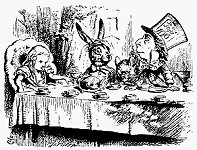 'Exactly so,' said Alice.
'Exactly so,' said Alice.
'Then you should say what you mean,' the March Hare went on.
'I do,' Alice hastily replied; 'at least--at least I mean what I say--that's the same thing, you know.'
'Not the same thing a bit!' said the Hatter. 'You might just as well say that "I see what I eat" is the same thing as "I eat what I see"!'
'You might just as well say,' added the March Hare, 'that "I like what I get" is the same thing as "I get what I like"!'
'You might just as well say,' added the Dormouse, who seemed to be talking in his sleep, 'that "I breathe when I sleep" is the same thing as "I sleep when I breathe"!'
'It is the same thing with you,' said the Hatter, and here the conversation dropped, and the party sat silent for a minute,while Alice thought over all she could remember about ravens and writing-desks, which wasn't much.
The Hatter was the first to break the silence. 'What day of the month is it?' he said, turning to Alice: he had taken his watch out of his pocket, and was looking at it uneasily, shaking it every now and then, and holding it to his ear.
Alice considered a little, and then said 'The fourth.'
'Two days wrong!' sighed the Hatter. 'I told you butter wouldn't suit the works!' he added looking angrily at the March Hare.
'It was the best butter,' the March Hare meekly replied.
'Yes, but some crumbs must have got in as well,' the Hatter grumbled: 'you shouldn't have put it in with the bread-knife.'
The March Hare took the watch and looked at it gloomily: then he dipped it into his cup of tea, and looked at it again: but he could think of nothing better to say than his first remark, 'It was the best butter, you know.'
Alice had been looking over his shoulder with some curiosity.'What a funny watch!' she remarked. 'It tells the day of the month, and doesn't tell what o'clock it is!'
'Why should it?' muttered the Hatter. 'Does your watch tell you what year it is?'
'Of course not,' Alice replied very readily: 'but that's because it stays the same year for such a long time together.'
'Which is just the case with mine,' said the Hatter.
Alice felt dreadfully puzzled. The Hatter's remark seemed to have no sort of meaning in it, and yet it was certainly English. 'I don't quite understand you,' she said, as politely as she could. 'The Dormouse is asleep again,' said the Hatter, and he poured a little hot tea upon its nose.
The Dormouse shook its head impatiently, and said, without opening its eyes, 'Of course, of course; just what I was going to remark myself.'
'Have you guessed the riddle yet?' the Hatter said, turning to Alice again.
'No, I give it up,' Alice replied: 'what's the answer?'
'I haven't the slightest idea,' said the Hatter. 'Nor I,' said the March Hare.
Alice sighed wearily. 'I think you might do something better with the time,' she said, 'than waste it in asking riddles that have no answers.'
'If you knew Time as well as I do,' said the Hatter, 'you wouldn't talk about wasting it. It's him.'
I don't know what you mean,' said Alice.
'Of course you don't!' the Hatter said, tossing his head contemptuously. 'I dare say you never even spoke to Time!'
'Perhaps not,' Alice cautiously replied: 'but I know I have to beat time when I learn music.'
'Ah! that accounts for it,' said the Hatter. 'He won't stand beating. Now, if you only kept on good terms with him, he'd do almost anything you liked with the clock. For instance, suppose it were nine o'clock in the morning, just time to begin lessons: you'd only have to whisper a hint to Time, and round goes the clock in a twinkling! Half-past one, time for dinner!'
('I only wish it was,' the March Hare said to itself in a whisper.)
'That would be grand, certainly,' said Alice thoughtfully: 'but then--I shouldn't be hungry for it, you know.'
'Not at first, perhaps,' said the Hatter: 'but you could keep it to half-past one as long as you liked.'
'Is that the way you manage?' Alice asked.
The Hatter shook his head mournfully. 'Not I!' he replied. 'We quarrelled last March--just before he went mad, you know--' (pointing with his tea spoon at the March Hare,) '--it was at the great concert given by the Queen of Hearts, and I had to sing
"Twinkle, twinkle, little bat!
How I wonder what you're at!"
You know the song, perhaps?'
'I've heard something like it,' said Alice.
'It goes on, you know,' the Hatter continued, 'in this way:--
"Up above the world you fly,
Like a tea-tray in the sky.
Twinkle, twinkle--"'
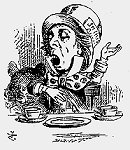 Here the Dormouse shook itself, and began singing in its sleep'Twinkle, twinkle, twinkle, twinkle--' and went on so long that they had to pinch it to make it stop.
Here the Dormouse shook itself, and began singing in its sleep'Twinkle, twinkle, twinkle, twinkle--' and went on so long that they had to pinch it to make it stop.
'Well, I'd hardly finished the first verse,' said the Hatter,'when the Queen jumped up and bawled out, "He's murdering the time! Off with his head!"'
'How dreadfully savage!' exclaimed Alice.
'And ever since that,' the Hatter went on in a mournful tone, 'he won't do a thing I ask! It's always six o'clock now.'
A bright idea came into Alice's head. 'Is that the reason so many tea-things are put out here?' she asked.
'Yes, that's it,' said the Hatter with a sigh: 'it's always tea-time, and we've no time to wash the things between whiles.'
'Then you keep moving round, I suppose?' said Alice.
'Exactly so,' said the Hatter: 'as the things get used up.'
'But what happens when you come to the beginning again?' Alice ventured to ask.
'Suppose we change the subject,' the March Hare interrupted, yawning. 'I'm getting tired of this. I vote the young lady tells us a story.'
'I'm afraid I don't know one,' said Alice, rather alarmed at the proposal.
'Then the Dormouse shall!' they both cried. 'Wake up, Dormouse!'And they pinched it on both sides at once.
The Dormouse slowly opened his eyes. 'I wasn't asleep,' he said in a hoarse, feeble voice: 'I heard every word you fellows were saying.'
'Tell us a story!' said the March Hare.
'Yes, please do!' pleaded Alice.
'And be quick about it,' added the Hatter, 'or you'll be asleep again before it's done.'
'Once upon a time there were three little sisters,' the Dormouse began in a great hurry; 'and their names were Elsie, Lacie, and Tillie; and they lived at the bottom of a well--'
'What did they live on?' said Alice, who always took a great interest in questions of eating and drinking.
'They lived on treacle,' said the Dormouse, after thinking a minute or two.
'They couldn't have done that, you know,' Alice gently remarked; 'they'd have been ill.'
'So they were,' said the Dormouse; 'very ill.'
Alice tried to fancy to herself what such an extraordinary ways of living would be like, but it puzzled her too much, so she went on: 'But why did they live at the bottom of a well?'
'Take some more tea,' the March Hare said to Alice, very earnestly.
'I've had nothing yet,' Alice replied in an offended tone, 'so I can't take more.'
'You mean you can't take less,' said the Hatter: 'it's very easy to take more than nothing.'
'Nobody asked your opinion,' said Alice.
'Who's making personal remarks now?' the Hatter asked triumphantly.
Alice did not quite know what to say to this: so she helped herself to some tea and bread-and-butter, and then turned to the Dormouse, and repeated her question. 'Why did they live at the bottom of a well?'
The Dormouse again took a minute or two to think about it, and then said, 'It was a treacle-well.'
'There's no such thing!' Alice was beginning very angrily, but
the Hatter and the March Hare went 'Sh! sh!' and the Dormouse sulkily remarked, 'If you can't be civil, you'd better finish the story for yourself.'
'No, please go on!' Alice said very humbly; 'I won't interrupt again. I dare say there may be one.'
'One, indeed!' said the Dormouse indignantly. However, he consented to go on. 'And so these three little sisters--they were learning to draw, you know--'
'What did they draw?' said Alice, quite forgetting her promise.
'Treacle,' said the Dormouse, without considering at all this time.
'I want a clean cup,' interrupted the Hatter: 'let's all move one place on.'
He moved on as he spoke, and the Dormouse followed him: the March Hare moved into the Dormouse's place, and Alice rather unwillingly took the place of the March Hare. The Hatter was the only one who got any advantage from the change: and Alice was a good deal worse off than before, as the March Hare had just upset the milk-jug into his plate.
Alice did not wish to offend the Dormouse again, so she began very cautiously: 'But I don't understand. Where did they draw the treacle from?'
'You can draw water out of a water-well,' said the Hatter; 'so I should think you could draw treacle out of a treacle-well--eh, stupid?'
'But they were in the well,' Alice said to the Dormouse, not choosing to notice this last remark.
'Of course they were', said the Dormouse; '--well in.'
This answer so confused poor Alice, that she let the Dormouse goon for some time without interrupting it.
'They were learning to draw,' the Dormouse went on, yawning and rubbing its eyes, for it was getting very sleepy; 'and they drew all manner of things--everything that begins with an M--'
'Why with an M?' said Alice.
'Why not?' said the March Hare.
Alice was silent.
The Dormouse had closed its eyes by this time, and was going off into a doze; but, on being pinched by the Hatter, it woke up again with a little shriek, and went on: '--that begins with an M, such as mouse-traps, and the moon, and memory, and muchness--you know you say things are "much of a muchness"--did you ever see such a thing as a drawing of a muchness?'
'Really, now you ask me,' said Alice, very much confused, 'I don't think--'
'Then you shouldn't talk,' said the Hatter.
This piece of rudeness was more than Alice could bear: she got up in great disgust, and walked off; the Dormouse fell asleep instantly, and neither of the others took the least notice of her going, though she looked back once or twice, half hoping that they would call after her: the last time she saw them, they were trying to put the Dormouse into the teapot.
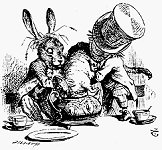 'At any rate I'll never go there again!' said Alice as she picked her way through the wood. 'It's the stupidest tea-party I ever was at in all my life!'
'At any rate I'll never go there again!' said Alice as she picked her way through the wood. 'It's the stupidest tea-party I ever was at in all my life!'
Just as she said this, she noticed that one of the trees had a door leading right into it. 'That's very curious!' she thought. 'But everything's curious today. I think I may as well go in at once.' And in she went.
Once more she found herself in the long hall, and close to the little glass table. 'Now, I'll manage better this time,' she said to herself, and began by taking the little golden key, and unlocking the door that led into the garden. Then she went to work nibbling at the mushroom (she had kept a piece of it in her pocket) till she was about a foot high: then she walked down the little passage: and then--she found herself at last in the beautiful garden, among the bright flower-beds and the cool fountains.


The Queen's Croquet-Ground
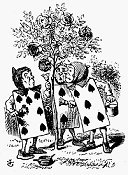 A large rose-tree stood near the entrance of the garden: the roses growing on it were white, but there were three gardeners at it, busily painting them red. Alice thought this a very curious thing, and she went nearer to watch them, and just as she came up to them she heard one of them say, 'Look out now, Five! Don't go splashing paint over me like that!'
A large rose-tree stood near the entrance of the garden: the roses growing on it were white, but there were three gardeners at it, busily painting them red. Alice thought this a very curious thing, and she went nearer to watch them, and just as she came up to them she heard one of them say, 'Look out now, Five! Don't go splashing paint over me like that!'
'I couldn't help it,' said Five, in a sulky tone; 'Seven jogged my elbow.'
On which Seven looked up and said, 'That's right, Five! Always lay the blame on others!'
You'd better not talk!' said Five. 'I heard the Queen say only yesterday you deserved to be beheaded!'
'What for?' said the one who had spoken first.
'That's none of your business, Two!' said Seven.
'Yes, it is his business!' said Five, 'and I'll tell him--it was for bringing the cook tulip-roots instead of onions.'
Seven flung down his brush, and had just begun 'Well, of all the unjust things--' when his eye chanced to fall upon Alice, as she stood watching them, and he checked himself suddenly: the others looked round also, and all of them bowed low.
'Would you tell me,' said Alice, a little timidly, 'why you are painting those roses?'
Five and Seven said nothing, but looked at Two. Two began in a low voice, 'Why the fact is, you see, Miss, this here ought to have been a red rose-tree, and we put a white one in by mistake; and if the Queen was to find it out, we should all have our heads cut off, you know. So you see, Miss, we're doing our best, afore she comes, to--' At this moment Five, who had been anxiously looking across the garden, called out 'The Queen! The Queen!' and the three gardeners instantly threw themselves flat upon their faces. There was a sound of many footsteps, and Alice looked round, eager to see the Queen.
First came ten soldiers carrying clubs; these were all shaped like the three gardeners, oblong and flat, with their hands and feet at the corners: next the ten courtiers; these were ornamented all over with diamonds, and walked two and two, as the soldiers did. After these came the royal children; there were ten of them, and the little dears came jumping merrily along hand in hand, in couples: they were all ornamented with hearts. Next came the guests, mostly Kings and Queens, and among them Alice recognised the White Rabbit: it was talking in a hurried nervous manner, smiling at everything that was said, and went by without noticing her. Then followed the Knave of Hearts, carrying the King's crown on a crimson velvet cushion; and, last of all this grand procession, came THE KING AND QUEEN OF HEARTS.
Alice was rather doubtful whether she ought not to lie down on her face like the three gardeners, but she could not remember ever having heard of such a rule at processions; 'and besides, what would be the use of a procession,' thought she, 'if people had all to lie down upon their faces, so that they couldn't see it?' So she stood still where she was, and waited.
When the procession came opposite to Alice, they all stopped and looked at her, and the Queen said severely 'Who is this?' She said it to the Knave of Hearts, who only bowed and smiled in reply.
'Idiot!' said the Queen, tossing her head impatiently; and, turning to Alice, she went on, 'What's your name, child?'
'My name is Alice, so please your Majesty,' said Alice very politely; but she added, to herself, 'Why, they're only a pack of cards, after all. I needn't be afraid of them!'
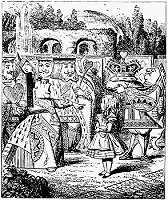 'And who are these?' said the Queen, pointing to the three gardeners who were lying round the rose tree; for, you see, as they were lying on their faces, and the pattern on their backs was the same as the rest of the pack, she could not tell whether they were gardeners, or soldiers, or courtiers, or three of her own children.
'And who are these?' said the Queen, pointing to the three gardeners who were lying round the rose tree; for, you see, as they were lying on their faces, and the pattern on their backs was the same as the rest of the pack, she could not tell whether they were gardeners, or soldiers, or courtiers, or three of her own children.
'How should I know?' said Alice, surprised at her own courage. 'It's no business of mine.'
The Queen turned crimson with fury, and, after glaring at her for a moment like a wild beast, screamed 'Off with her head! Off--'
'Nonsense!' said Alice, very loudly and decidedly, and the Queen was silent.
The King laid his hand upon her arm, and timidly said 'Consider, my dear: she is only a child!'
The Queen turned angrily away from him, and said to the Knave 'Turn them over!'
The Knave did so, very carefully, with one foot.
'Get up!' said the Queen, in a shrill, loud voice, and the three gardeners instantly jumped up, and began bowing to the King, the Queen, the royal children, and everybody else.
'Leave off that!' screamed the Queen. 'You make me giddy.' And then, turning to the rose-tree, she went on, 'What haveyou been doing here?'
'May it please your Majesty,' said Two, in a very humble tone, going down on one knee as he spoke, 'we were trying--'
'I see!' said the Queen, who had meanwhile been examining the roses. 'Off with their heads!' and the procession moved on, three of the soldiers remaining behind to execute the unfortunate gardeners, who ran to Alice for protection.
'You shan't be beheaded!' said Alice, and she put them into a large flower-pot that stood near. The three soldiers wandered about for a minute or two, looking for them, and then quietly marched off after the others.
'Are their heads off?' shouted the Queen.
'Their heads are gone, if it please your Majesty!' the soldiers shouted in reply.
'That's right!' shouted the Queen. 'Can you play croquet?'
The soldiers were silent, and looked at Alice, as the question was evidently meant for her.
'Yes!' shouted Alice.
'Come on, then!' roared the Queen, and Alice joined the procession, wondering very much what would happen next.
'It's--it's a very fine day!' said a timid voice at her side. She was walking by the White Rabbit, who was peeping anxiously into her face.
'Very,' said Alice: '--where's the Duchess?'
'Hush! Hush!' said the Rabbit in a low, hurried tone. He looked anxiously over his shoulder as he spoke, and then raised himself upon tiptoe, put his mouth close to her ear, and whispered 'She's under sentence of execution.'
'What for?' said Alice.
'Did you say "What a pity!"?' the Rabbit asked.
'No, I didn't,' said Alice: 'I don't think it's at all a pity. I said "What for?"'
'She boxed the Queen's ears--' the Rabbit began. Alice gave a little scream of laughter. 'Oh, hush!' the Rabbit whispered in a frightened tone. 'The Queen will hear you! You see, she came rather late, and the Queen said--'
'Get to your places!' shouted the Queen in a voice of thunder, and people began running about in all directions, tumbling up against each other; however, they got settled down in a minute or two, and the game began. Alice thought she had never seen such a curious croquet-ground in her life; it was all ridges and furrows; the balls were live hedgehogs, the mallets live flamingoes, and the soldiers had to double themselves up and to stand on their hands and feet, to make the arches.
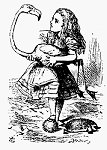 The chief difficulty Alice found at first was in managing her flamingo: she succeeded in getting its body tucked away, comfortably enough, under her arm, with its legs hanging down, but generally, just as she had got its neck nicely straightened out, and was going to give the hedgehog a blow with its head, itwould twist itself round and look up in her face, with such a puzzled expression that she could not help bursting out laughing: and when she had got its head down, and was going to begin again, it was very provoking to find that the hedgehog had unrolled itself, and was in the act of crawling away: besides all this, there was generally a ridge or furrow in the way wherever she wanted to send the hedgehog to, and, as the doubled-up soldiers were always getting up and walking off to other parts of the ground, Alice soon came to the conclusion that it was a very difficult game indeed.
The chief difficulty Alice found at first was in managing her flamingo: she succeeded in getting its body tucked away, comfortably enough, under her arm, with its legs hanging down, but generally, just as she had got its neck nicely straightened out, and was going to give the hedgehog a blow with its head, itwould twist itself round and look up in her face, with such a puzzled expression that she could not help bursting out laughing: and when she had got its head down, and was going to begin again, it was very provoking to find that the hedgehog had unrolled itself, and was in the act of crawling away: besides all this, there was generally a ridge or furrow in the way wherever she wanted to send the hedgehog to, and, as the doubled-up soldiers were always getting up and walking off to other parts of the ground, Alice soon came to the conclusion that it was a very difficult game indeed.
The players all played at once without waiting for turns, quarrelling all the while, and fighting for the hedgehogs; and in a very short time the Queen was in a furious passion, and went stamping about, and shouting 'Off with his head!' or 'Off with her head!' about once in a minute.
Alice began to feel very uneasy: to be sure, she had not as yet had any dispute with the Queen, but she knew that it might happen any minute, 'and then,' thought she, 'what would become of me? They're dreadfully fond of beheading people here; the great wonder is, that there's any one left alive!'
She was looking about for some way of escape, and wondering whether she could get away without being seen, when she noticed a curious appearance in the air: it puzzled her very much at first, but, after watching it a minute or two, she made it out to be a grin, and she said to herself 'It's the Cheshire Cat: now I shall have somebody to talk to.'
'How are you getting on?' said the Cat, as soon as there was mouth enough for it to speak with.
Alice waited till the eyes appeared, and then nodded. 'It's no use speaking to it,' she thought, 'till its ears have come, or at least one of them.' In another minute the whole head appeared, and then Alice put down her flamingo, and began an account of the game, feeling very glad she had someone to listen to her. The Cat seemed to think that there was enough of it now in sight, and no more of it appeared.
'I don't think they play at all fairly,' Alice began, in rather a complaining tone, 'and they all quarrel so dreadfully one can't hear oneself speak--and they don't seem to have any rules in particular; at least, if there are, nobody attends to them--and you've no idea how confusing it is all the things being alive; for instance, there's the arch I've got to go through next walking about at the other end of the ground--and I should have croqueted the Queen's hedgehog just now, only it ran away when it saw mine coming!'
'How do you like the Queen?' said the Cat in a low voice.
'Not at all,' said Alice: 'she's so extremely--' Just then she noticed that the Queen was close behind her, listening: so she went on, '--likely to win, that it's hardly worth while finishing the game.'
The Queen smiled and passed on.
'Who are you talking to?' said the King, going up to Alice, and looking at the Cat's head with great curiosity.
'It's a friend of mine--a Cheshire Cat,' said Alice: 'allow me to introduce it.'
'I don't like the look of it at all,' said the King: 'however, it may kiss my hand if it likes.'
'I'd rather not,' the Cat remarked.
'Don't be impertinent,' said the King, 'and don't look at me like that!' He got behind Alice as he spoke.
'A cat may look at a king,' said Alice. 'I've read that in some book, but I don't remember where.'
'Well, it must be removed,' said the King very decidedly, and he called the Queen, who was passing at the moment, 'My dear! I wish you would have this cat removed!'
The Queen had only one way of settling all difficulties, great or small. 'Off with his head!' she said, without even looking round.
'I'll fetch the executioner myself,' said the King eagerly, and he hurried off.
Alice thought she might as well go back, and see how the game was going on, as she heard the Queen's voice in the distance, screaming with passion. She had already heard her sentence three of the players to be executed for having missed their turns, and she did not like the look of things at all, as the game was in such confusion that she never knew whether it was her turn or not. So she went in search of her hedgehog.
The hedgehog was engaged in a fight with another hedgehog, which seemed to Alice an excellent opportunity for croqueting one of them with the other: the only difficulty was, that her flamingo was gone across to the other side of the garden, where Alice could see it trying in a helpless sort of way to fly up into a tree.
By the time she had caught the flamingo and brought it back, the fight was over, and both the hedgehogs were out of sight: 'but it doesn't matter much,' thought Alice, 'as all the arches are gone from this side of the ground.' So she tucked it away under her arm, that it might not escape again, and went back for a little more conversation with her friend.
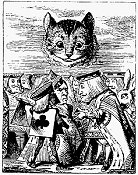 When she got back to the Cheshire Cat, she was surprised to find quite a large crowd collected round it: there was a dispute going on between the executioner, the King, and the Queen, who were all talking at once, while all the rest were quite silent, and looked very uncomfortable.
When she got back to the Cheshire Cat, she was surprised to find quite a large crowd collected round it: there was a dispute going on between the executioner, the King, and the Queen, who were all talking at once, while all the rest were quite silent, and looked very uncomfortable.
The moment Alice appeared, she was appealed to by all three to settle the question, and they repeated their arguments to her, though, as they all spoke at once, she found it very hard indeed to make out exactly what they said.
The executioner's argument was, that you couldn't cut off a head unless there was a body to cut it off from: that he had never had to do such a thing before, and he wasn't going to begin athis time of life.
The King's argument was, that anything that had a head could be beheaded, and that you weren't to talk nonsense.
The Queen's argument was, that if something wasn't done about it in less than no time she'd have everybody executed, all round. (It was this last remark that had made the whole party look so grave and anxious.)
Alice could think of nothing else to say but 'It belongs to the Duchess: you'd better ask her about it.'
'She's in prison,' the Queen said to the executioner: 'fetch her here.' And the executioner went off like an arrow.
The Cat's head began fading away the moment he was gone, and, by the time he had come back with the Duchess, it had entirely disappeared; so the King and the executioner ran wildly up and down looking for it, while the rest of the party went back to the game.


The Mock Turtle's Story
'You can't think how glad I am to see you again, you dear old thing!' said the Duchess, as she tucked her arm affectionately into Alice's, and they walked off together.
Alice was very glad to find her in such a pleasant temper, and thought to herself that perhaps it was only the pepper that had made her so savage when they met in the kitchen.
'When I'm a Duchess,' she said to herself, (not in a very hopeful tone though), 'I won't have any pepper in my kitchenat all. Soup does very well without--Maybe it's always pepper that makes people hot-tempered,' she went on, very much pleased at having found out a new kind of rule, 'and vinegar that makes them sour--and camomile that makes them bitter--and--and barley-sugar and such things that make children sweet-tempered. I only wish people knew that: then they wouldn't be so stingy about it, you know--'
She had quite forgotten the Duchess by this time, and was a little startled when she heard her voice close to her ear. 'You're thinking about something, my dear, and that makes you forget to talk. I can't tell you just now what the moral of that is, but I shall remember it in a bit.'
'Perhaps it hasn't one,' Alice ventured to remark.
'Tut, tut, child!' said the Duchess. 'Everything's got a moral, if only you can find it.' And she squeezed herself up closer to Alice's side as she spoke.
Alice did not much like keeping so close to her: first, because the Duchess was very ugly; and secondly, because she was exactly the right height to rest her chin upon Alice's shoulder, and it was an uncomfortably sharp chin. However, she did not like to be rude, so she bore it as well as she could.
'The game's going on rather better now,' she said, by way of keeping up the conversation a little.
''Tis so,' said the Duchess: 'and the moral of that is--"Oh, 'tis love, 'tis love, that makes the world go round!"'
'Somebody said,' Alice whispered, 'that it's done by everybody minding their own business!'
'Ah, well! It means much the same thing,' said the Duchess, digging her sharp little chin into Alice's shoulder as she added,'and the moral of that is--"Take care of the sense, and the sounds will take care of themselves."'
'How fond she is of finding morals in things!' Alice thought to herself.
'I dare say you're wondering why I don't put my arm round your waist,' the Duchess said after a pause: 'the reason is, that I'm doubtful about the temper of your flamingo. Shall I try the experiment?'
'He might bite,' Alice cautiously replied, not feeling at all anxious to have the experiment tried.
'Very true,' said the Duchess: 'flamingoes and mustard both bite. And the moral of that is--"Birds of a feather flock together."'
'Only mustard isn't a bird,' Alice remarked.
'Right, as usual,' said the Duchess: 'what a clear way you have of putting things!'
'It's a mineral, I think,' said Alice.
 'Of course it is,' said the Duchess, who seemed ready to agree to everything that Alice said; 'there's a large mustard-mine near here. And the moral of that is--"The more there is of mine, the less there is of yours."'
'Of course it is,' said the Duchess, who seemed ready to agree to everything that Alice said; 'there's a large mustard-mine near here. And the moral of that is--"The more there is of mine, the less there is of yours."'
'Oh, I know!' exclaimed Alice, who had not attended to this last remark, 'it's a vegetable. It doesn't look like one, but it is.'
'I quite agree with you,' said the Duchess; 'and the moral of that is--"Be what you would seem to be"--or if you'd like it put more simply--"Never imagine yourself not to be otherwise than what it might appear to others that what you were or might have been was not otherwise than what you had been would have appeared to them to be otherwise."'
'I think I should understand that better,' Alice said very politely, 'if I had it written down: but I can't quite follow it as you say it.'
'That's nothing to what I could say if I chose,' the Duchess replied, in a pleased tone.
'Pray don't trouble yourself to say it any longer than that,' said Alice.
'Oh, don't talk about trouble!' said the Duchess. 'I make you a present of everything I've said as yet.'
'A cheap sort of present!' thought Alice. 'I'm glad they don't give birthday presents like that!' But she did not venture to say it out loud.
'Thinking again?' the Duchess asked, with another dig of her sharp little chin.
'I've a right to think,' said Alice sharply, for she was beginning to feel a little worried.
'Just about as much right,' said the Duchess, 'as pigs have to fly; and the m--'
But here, to Alice's great surprise, the Duchess's voice died away, even in the middle of her favourite word 'moral,' and the arm that was linked into hers began to tremble. Alice looked up, and there stood the Queen in front of them, with her arms folded, frowning like a thunderstorm.
'A fine day, your Majesty!' the Duchess began in a low, weak voice.
'Now, I give you fair warning,' shouted the Queen, stamping on the ground as she spoke; 'either you or your head must be off, and that in about half no time! Take your choice!'
The Duchess took her choice, and was gone in a moment.
'Let's go on with the game,' the Queen said to Alice; and Alice was too much frightened to say a word, but slowly followed her back to the croquet-ground.
The other guests had taken advantage of the Queen's absence, and were resting in the shade: however, the moment they saw her, they hurried back to the game, the Queen merely remarking that a moment's delay would cost them their lives.
All the time they were playing the Queen never left off quarrelling with the other players, and shouting 'Off with his head!' or 'Off with her head!' Those whom she sentenced were taken into custody by the soldiers, who of course had to leave off being arches to do this, so that by the end of half an hour or so there were no arches left, and all the players, except the King, the Queen, and Alice, were in custody and under sentence of execution.
Then the Queen left off, quite out of breath, and said to Alice, 'Have you seen the Mock Turtle yet?'
'No,' said Alice. 'I don't even know what a Mock Turtle is.'
'It's the thing Mock Turtle Soup is made from,' said the Queen.
'I never saw one, or heard of one,' said Alice.
'Come on, then,' said the Queen, 'and he shall tell you his history,'
As they walked off together, Alice heard the King say in a low voice, to the company generally, 'You are all pardoned.' 'Come,that's a good thing!' she said to herself, for she had felt quite unhappy at the number of executions the Queen had ordered.
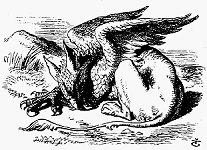 They very soon came upon a Gryphon, lying fast asleep in the sun. (IF you don't know what a Gryphon is, look at the picture.) 'Up, lazy thing!' said the Queen, 'and take this young lady to see the Mock Turtle, and to hear his history. I must go back and see after some executions I have ordered'; and she walked off, leaving Alice alone with the Gryphon. Alice did not quite like the look of the creature, but on the whole she thought it would be quite as safe to stay with it as to go after that savage Queen: so she waited.
They very soon came upon a Gryphon, lying fast asleep in the sun. (IF you don't know what a Gryphon is, look at the picture.) 'Up, lazy thing!' said the Queen, 'and take this young lady to see the Mock Turtle, and to hear his history. I must go back and see after some executions I have ordered'; and she walked off, leaving Alice alone with the Gryphon. Alice did not quite like the look of the creature, but on the whole she thought it would be quite as safe to stay with it as to go after that savage Queen: so she waited.
The Gryphon sat up and rubbed its eyes: then it watched the Queen till she was out of sight: then it chuckled. 'What fun!' said the Gryphon, half to itself, half to Alice.
'What IS the fun?' said Alice.
'Why, she,' said the Gryphon. 'It's all her fancy, that: they never executes nobody, you know. Come on!'
'Everybody says "come on!" here,' thought Alice, as she went slowly after it: 'I never was so ordered about in all my life, never!'
They had not gone far before they saw the Mock Turtle in the distance, sitting sad and lonely on a little ledge of rock, and, as they came nearer, Alice could hear him sighing as if his heart would break. She pitied him deeply. 'What is his sorrow?' she asked the Gryphon, and the Gryphon answered, very nearly in the same words as before, 'It's all his fancy, that: he hasn't got no sorrow, you know. Come on!'
So they went up to the Mock Turtle, who looked at them with large eyes full of tears, but said nothing.
'This here young lady,' said the Gryphon, 'she wants for to know your history, she do.'
'I'll tell it her,' said the Mock Turtle in a deep, hollow tone: 'sit down, both of you, and don't speak a word till I've finished.'
So they sat down, and nobody spoke for some minutes. Alice thought to herself, 'I don't see how he can even finish,if he doesn't begin.' But she waited patiently.
'Once,' said the Mock Turtle at last, with a deep sigh, 'I was a real Turtle.'
These words were followed by a very long silence, broken only by an occasional exclamation of 'Hjckrrh!' from the Gryphon, and the constant heavy sobbing of the Mock Turtle. Alice was very nearly getting up and saying, 'Thank you, sir, for your interesting story,' but she could not help thinking there must be more to come, so she sat still and said nothing.
'When we were little,' the Mock Turtle went on at last, more calmly, though still sobbing a little now and then, 'we went to school in the sea. The master was an old Turtle--we used to call him Tortoise--'
'Why did you call him Tortoise, if he wasn't one?' Alice asked.
'We called him Tortoise because he taught us,' said the Mock Turtle angrily: 'really you are very dull!'
'You ought to be ashamed of yourself for asking such a simple question,' added the Gryphon; and then they both sat silent and looked at poor Alice, who felt ready to sink into the earth. At last the Gryphon said to the Mock Turtle, 'Drive on, old fellow! Don't be all day about it!' and he went on in these words:
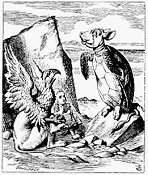 'Yes, we went to school in the sea, though you mayn't believe it--'
'Yes, we went to school in the sea, though you mayn't believe it--'
'I never said I didn't!' interrupted Alice.
'You did,' said the Mock Turtle.
'Hold your tongue!' added the Gryphon, before Alice could speak again. The Mock Turtle went on.
'We had the best of educations--in fact, we went to school every day--' 'I've been to a day-school, too,' said Alice; 'you needn't be so proud as all that.'
'With extras?' asked the Mock Turtle a little anxiously.
'Yes,' said Alice, 'we learned French and music.'
'And washing?' said the Mock Turtle.
'Certainly not!' said Alice indignantly.
'Ah! then yours wasn't a really good school,' said the Mock Turtle in a tone of great relief. 'Now at ours they had at the end of the bill, "French, music, and washing--extra."'
'You couldn't have wanted it much,' said Alice; 'living at the bottom of the sea.'
'I couldn't afford to learn it.' said the Mock Turtle with a sigh. 'I only took the regular course.'
'What was that?' inquired Alice.
'Reeling and Writhing, of course, to begin with,' the Mock Turtle replied; 'and then the different branches of Arithmetic--Ambition, Distraction, Uglification, and Derision.'
'I never heard of "Uglification,"' Alice ventured to say. 'What is it?'
The Gryphon lifted up both its paws in surprise. 'What! Never heard of uglifying!' it exclaimed. 'You know what to beautify is, I suppose?' 'Yes,' said Alice doubtfully: 'it means--to--make--anything--prettier.'
'Well, then,' the Gryphon went on, 'if you don't know what to uglify is, you are a simpleton.'
Alice did not feel encouraged to ask any more questions about it, so she turned to the Mock Turtle, and said 'What else had you to learn?'
'Well, there was Mystery,' the Mock Turtle replied, counting off the subjects on his flappers, '--Mystery, ancient and modern, with Seaography: then Drawling--the Drawling-master was an old conger-eel, that used to come once a week: He taught us Drawling, Stretching, and Fainting in Coils.'
'What was that like?' said Alice.
'Well, I can't show it you myself,' the Mock Turtle said: 'I'm too stiff. And the Gryphon never learnt it.'
'Hadn't time,' said the Gryphon: 'I went to the Classics master, though. He was an old crab, he was.'
'I never went to him,' the Mock Turtle said with a sigh: 'he taught Laughing and Grief, they used to say.'
'So he did, so he did,' said the Gryphon, sighing in his turn; and both creatures hid their faces in their paws.
'And how many hours a day did you do lessons?' said Alice, in a hurry to change the subject.
'Ten hours the first day,' said the Mock Turtle: 'nine the next, and so on.'
'What a curious plan!' exclaimed Alice.
'That's the reason they're called lessons,' the Gryphon remarked: 'because they lessen from day to day.'
This was quite a new idea to Alice, and she thought it over a little before she made her next remark. 'Then the eleventh day must have been a holiday?'
'Of course it was,' said the Mock Turtle.
'And how did you manage on the twelfth?' Alice went on eagerly.
'That's enough about lessons,' the Gryphon interrupted in a very decided tone: 'tell her something about the games now.'
| 






